 The events of the past six years have sharpened Gilroy's observations. At the same time, they have made it increasingly clear that, despite the real progress achieved, attempts to maintain privileges based on structural and systemic inequality, whether in terms of class, gender or race, have become even more obstinate. Attempts that go hand in hand with the futile but devastating efforts to deny history and impose the erasure of memory.
The events of the past six years have sharpened Gilroy's observations. At the same time, they have made it increasingly clear that, despite the real progress achieved, attempts to maintain privileges based on structural and systemic inequality, whether in terms of class, gender or race, have become even more obstinate. Attempts that go hand in hand with the futile but devastating efforts to deny history and impose the erasure of memory.
18.02.2021 | by Paulo de Medeiros
 Black historic and political figures have been rendered as vanquishing heroes as well. Noble, brave and transcendent, they have remarkable stories. We tremble in awe before the recounting of Frederick Douglass escaping from slavery and Ida B. Wells narrowly evading the Klan in Memphis, saving her own life — then, through her investigative journalism into the practice of lynching, saving the lives of countless others. Martin Luther King Jr., who survived threats, bombs and jail cells before falling to an assassin’s bullets, has been rendered as the ultimate hero. His depiction is messianic. And though he was a key member of a vast and complex movement, he is often presented as singular. This is the way we tell history in the American public sphere.
Black historic and political figures have been rendered as vanquishing heroes as well. Noble, brave and transcendent, they have remarkable stories. We tremble in awe before the recounting of Frederick Douglass escaping from slavery and Ida B. Wells narrowly evading the Klan in Memphis, saving her own life — then, through her investigative journalism into the practice of lynching, saving the lives of countless others. Martin Luther King Jr., who survived threats, bombs and jail cells before falling to an assassin’s bullets, has been rendered as the ultimate hero. His depiction is messianic. And though he was a key member of a vast and complex movement, he is often presented as singular. This is the way we tell history in the American public sphere.
05.02.2021 | by Imani Perry
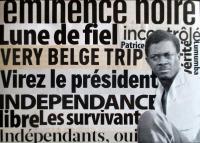 On June 30, 1960, at the ceremony for the proclamation of independence of the Congo, there were three speeches: from King Baudouin of Belgium, the former colonizing power, the President of the Congo, Joseph Kasavubu, and Patrice Lumumba, Prime Minister, the latter in an intervention not foreseen in the initial protocol. It was a short speech of about twelve minutes, written in an accessible and incisive language, performative and visual, a speech that, as the historian Jean Omasombo Tshonda defends, "founds the independent Congo". The first eight minutes are the clearest definition of what colonialism is from the point of view of a continent, a country, a community, a person.
On June 30, 1960, at the ceremony for the proclamation of independence of the Congo, there were three speeches: from King Baudouin of Belgium, the former colonizing power, the President of the Congo, Joseph Kasavubu, and Patrice Lumumba, Prime Minister, the latter in an intervention not foreseen in the initial protocol. It was a short speech of about twelve minutes, written in an accessible and incisive language, performative and visual, a speech that, as the historian Jean Omasombo Tshonda defends, "founds the independent Congo". The first eight minutes are the clearest definition of what colonialism is from the point of view of a continent, a country, a community, a person.
01.02.2021 | by Margarida Calafate Ribeiro
 Guardians put themselves on the line to defend the ideals sacred to democracy. In 2020, they fought on many fronts. When George Floyd was killed in Minneapolis in May, it was proof—if anyone needed it—that Black lives are still not treated as equal in America. In the aftermath of his death, a wave of outrage surged and was harnessed by organizers, both veteran and newly energized, to bring millions to the streets and spotlight the inequities in a world that claims to be far better than it is. The movement for racial justice found its voice in multitudes: a mother in Kenosha delivering her frank report to Joe Biden; a sister in Paris calling for police accountability in her brother’s death. In this extraordinary year, they guarded truth—lived truth.
Guardians put themselves on the line to defend the ideals sacred to democracy. In 2020, they fought on many fronts. When George Floyd was killed in Minneapolis in May, it was proof—if anyone needed it—that Black lives are still not treated as equal in America. In the aftermath of his death, a wave of outrage surged and was harnessed by organizers, both veteran and newly energized, to bring millions to the streets and spotlight the inequities in a world that claims to be far better than it is. The movement for racial justice found its voice in multitudes: a mother in Kenosha delivering her frank report to Joe Biden; a sister in Paris calling for police accountability in her brother’s death. In this extraordinary year, they guarded truth—lived truth.
29.12.2020 | by Justin Worland
 In the face of this new narrative that acknowledges artistic production and an appreciation of it by African communities, how do secular cultural traditions of African countries interact today with artistic training and production, in the case of Afrodescendant artists, who were born and raised in European countries? How do events in the history of Africa and Africans combine with the artistic languages of the "European schools" and, in particular, with contemporary themes?
In the face of this new narrative that acknowledges artistic production and an appreciation of it by African communities, how do secular cultural traditions of African countries interact today with artistic training and production, in the case of Afrodescendant artists, who were born and raised in European countries? How do events in the history of Africa and Africans combine with the artistic languages of the "European schools" and, in particular, with contemporary themes?
28.12.2020 | by António Pinto Ribeiro
 My own difficult experience teaching literature bears this out. Students’ response to every African story is that “the white man stole our culture, we are ashamed of our identity and need to return to our cultures”. But even as they limit colonialism to an exclusively cultural enterprise, they are not able to connect with stories of the past to which they say we should return to.
My own difficult experience teaching literature bears this out. Students’ response to every African story is that “the white man stole our culture, we are ashamed of our identity and need to return to our cultures”. But even as they limit colonialism to an exclusively cultural enterprise, they are not able to connect with stories of the past to which they say we should return to.
22.12.2020 | by Wandia Njoya
 What I seek in these encounters with overseas veterans is something I am unable to translate into a simple, telegraphic formula. Among these veterans there is a very strong sense of community, an almost familiar, almost tribal communion, which at certain times seems to me incompatible with a broader sense of community. It is a communion that tends to exclude me and all those who have not shared the same experience. What I seek in these conversations are the moments, similar to epiphanies, when veterans express belonging to a larger, more comprehensive human community, necessarily organized around moral values.
What I seek in these encounters with overseas veterans is something I am unable to translate into a simple, telegraphic formula. Among these veterans there is a very strong sense of community, an almost familiar, almost tribal communion, which at certain times seems to me incompatible with a broader sense of community. It is a communion that tends to exclude me and all those who have not shared the same experience. What I seek in these conversations are the moments, similar to epiphanies, when veterans express belonging to a larger, more comprehensive human community, necessarily organized around moral values.
13.12.2020 | by Paulo Faria
 As Black Lives Matter, we recognize and affirm the sanctity of all Black lives everywhere in the world. Following the murder of an unarmed civilian by the Special Anti-Robbery Squad (SARS) unit of the Nigerian police, young people across Nigeria have held protests denouncing years of brutality, torture, abductions, and killings. The demonstrations mark one of the largest Nigerian protest movements in generations. (...) There is a global movement for Black lives afoot. From the protestors in Cameroon who faced down water cannon and tear gas, to the fierce women in Namibia demanding #Shutitalldown, to the brave Zimbabweans campaigning for the release of Takudzwa Ngadziore, we will not be silenced and we cannot be stopped. The call for Black lives to matter is a rallying cry for all Black lives striving for liberation. We stand against all violence inflicted on black communities.
As Black Lives Matter, we recognize and affirm the sanctity of all Black lives everywhere in the world. Following the murder of an unarmed civilian by the Special Anti-Robbery Squad (SARS) unit of the Nigerian police, young people across Nigeria have held protests denouncing years of brutality, torture, abductions, and killings. The demonstrations mark one of the largest Nigerian protest movements in generations. (...) There is a global movement for Black lives afoot. From the protestors in Cameroon who faced down water cannon and tear gas, to the fierce women in Namibia demanding #Shutitalldown, to the brave Zimbabweans campaigning for the release of Takudzwa Ngadziore, we will not be silenced and we cannot be stopped. The call for Black lives to matter is a rallying cry for all Black lives striving for liberation. We stand against all violence inflicted on black communities.
04.11.2020 | by BLM
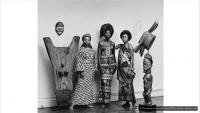 How a photographer, a group of models and a fashion show in Harlem kick-started a cultural and political movement that still inspires today. On 28 January 1962, a large crowd formed outside Purple Manor, a nightclub in the Harlem neighbourhood of New York City. A fashion show was taking place – an event that proved so popular it had to be held for a second time that same night – which sparked a movement that would change the way black people were represented forever. The show, titled Naturally ’62, was organised by the African Jazz-Art Society & Studios (AJASS), a group of creatives, including photographer Kwame Brathwaite.
How a photographer, a group of models and a fashion show in Harlem kick-started a cultural and political movement that still inspires today. On 28 January 1962, a large crowd formed outside Purple Manor, a nightclub in the Harlem neighbourhood of New York City. A fashion show was taking place – an event that proved so popular it had to be held for a second time that same night – which sparked a movement that would change the way black people were represented forever. The show, titled Naturally ’62, was organised by the African Jazz-Art Society & Studios (AJASS), a group of creatives, including photographer Kwame Brathwaite.
28.10.2020 | by Precious Adesina
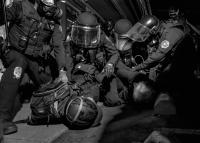 Throughout the nationwide upheaval set in motion by the police killing of George Floyd, in Minneapolis, on May 25th, Trump has vilified demonstrators as nefarious insurrectionists. Much as adversaries of the civil-rights movement once contended that it had been infiltrated by Communists, he invokes antifascists, or Antifa, to delegitimatize Black Lives Matter. A week after Floyd’s death, as popular uprisings spread from Minneapolis to other cities, the President declared, “Our nation has been gripped by professional anarchists, violent mobs, arsonists, looters, criminals, rioters, Antifa, and others.”
Throughout the nationwide upheaval set in motion by the police killing of George Floyd, in Minneapolis, on May 25th, Trump has vilified demonstrators as nefarious insurrectionists. Much as adversaries of the civil-rights movement once contended that it had been infiltrated by Communists, he invokes antifascists, or Antifa, to delegitimatize Black Lives Matter. A week after Floyd’s death, as popular uprisings spread from Minneapolis to other cities, the President declared, “Our nation has been gripped by professional anarchists, violent mobs, arsonists, looters, criminals, rioters, Antifa, and others.”
28.10.2020 | by Luke Mogelson
 The broad gains have led some in the British media to herald “the end of the ethnicity pay gap”, traducing the data and diminishing the issue to a “white v other” scrap among workers. The MailOnline’s dog-whistling headline – “Young employees from minority groups now earn MORE than white British workers” – is emblematic. This narrative is dangerous and misleading. Whether it is intentional or not, pitting the dominant ethnic group against minorities ignores systemic disadvantages between and within communities.
The broad gains have led some in the British media to herald “the end of the ethnicity pay gap”, traducing the data and diminishing the issue to a “white v other” scrap among workers. The MailOnline’s dog-whistling headline – “Young employees from minority groups now earn MORE than white British workers” – is emblematic. This narrative is dangerous and misleading. Whether it is intentional or not, pitting the dominant ethnic group against minorities ignores systemic disadvantages between and within communities.
16.10.2020 | by Halima Begum
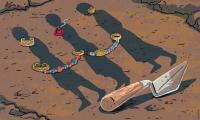 The cumulative individual tragedies on slave trails to the coast, in the barracoons, and on the beaches: no one can even count. So the four centuries of African enslavement by Europeans remains an abstract story. The need to make it real, to find things that you can see, touch and feel is what most motivated me to participate in the ambitious documentary series Enslaved with Samuel L Jackson, to be broadcast on the BBC starting on Sunday. It’s an attempt to get away from the numbers and statistics and instead focus on the real people who endured this era – their flesh and bone, dreams and legacies.
The cumulative individual tragedies on slave trails to the coast, in the barracoons, and on the beaches: no one can even count. So the four centuries of African enslavement by Europeans remains an abstract story. The need to make it real, to find things that you can see, touch and feel is what most motivated me to participate in the ambitious documentary series Enslaved with Samuel L Jackson, to be broadcast on the BBC starting on Sunday. It’s an attempt to get away from the numbers and statistics and instead focus on the real people who endured this era – their flesh and bone, dreams and legacies.
16.10.2020 | by Afua Hirsch
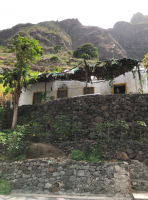 The present photo-essay is the result of recent fieldwork. On the islands, the inhabitants had to harness available resources (e.g., rain, soil, mountains and oceans) and follow a frugal but ingenious diet. Collectively, they triumphed over natural forces, western colonialism and deterministic forecasts.
The present photo-essay is the result of recent fieldwork. On the islands, the inhabitants had to harness available resources (e.g., rain, soil, mountains and oceans) and follow a frugal but ingenious diet. Collectively, they triumphed over natural forces, western colonialism and deterministic forecasts.
13.09.2020 | by Kaian Lam
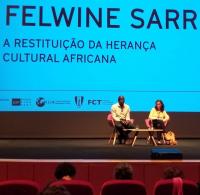 As Felwine Sarr insisted in his conference, the questions steam from the centrality of the canonic interpretation of what is a ‘cultural’ good, what is a collection, how was it formed, and above all, what power-knowledge relationship is at the core of the constitution of these collections; why is it problematic to ‘return’ the objects? Is it because it means European countries have to acknowledge their violent colonial past and that they have robbed the history and cultural production of others? Can we move beyond invisibility towards emergences (Santos, 2014)? Can we overstep the epistemic violence that shapes our times?
As Felwine Sarr insisted in his conference, the questions steam from the centrality of the canonic interpretation of what is a ‘cultural’ good, what is a collection, how was it formed, and above all, what power-knowledge relationship is at the core of the constitution of these collections; why is it problematic to ‘return’ the objects? Is it because it means European countries have to acknowledge their violent colonial past and that they have robbed the history and cultural production of others? Can we move beyond invisibility towards emergences (Santos, 2014)? Can we overstep the epistemic violence that shapes our times?
13.08.2020 | by Maria Paula Meneses
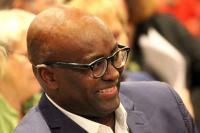 From the point of view of an uncompromising condemnation of colonialism, the indictment of the present-day practices of the state of Israel is a logical consequence. And to condemn all forms of colonialism is not equivalent to taking on an ideological stance, it is, purely and simply, a moral imperative.
From the point of view of an uncompromising condemnation of colonialism, the indictment of the present-day practices of the state of Israel is a logical consequence. And to condemn all forms of colonialism is not equivalent to taking on an ideological stance, it is, purely and simply, a moral imperative.
04.07.2020 | by António Sousa Ribeiro
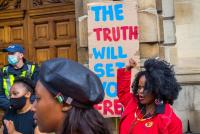 As academics, we teach about empire, slavery and colonialism because without them, the world makes no sense. Observing the protests against racism in the streets of the US, UK, Australia and elsewhere feels like watching not only a mass movement, but also a classroom, crackling with intellectual energy.
As academics, we teach about empire, slavery and colonialism because without them, the world makes no sense. Observing the protests against racism in the streets of the US, UK, Australia and elsewhere feels like watching not only a mass movement, but also a classroom, crackling with intellectual energy.
27.06.2020 | by Sanjay Seth, Francisco Carballo and David Martin
 On the basis of our experience as university teachers, we are not surprised that the murder of George Floyd in the US has injected renewed energy into the movements against racism worldwide, not least in Britain. No grounds for shock or surprise here.
On the basis of our experience as university teachers, we are not surprised that the murder of George Floyd in the US has injected renewed energy into the movements against racism worldwide, not least in Britain. No grounds for shock or surprise here.
27.06.2020 | by Sanjay Seth, Francisco Carballo and David Martin
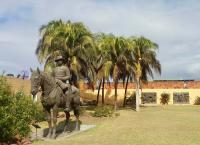 According to a government decision of the same year, Independence squares were to be set up in all provincial capitals and to receive identical but smaller statues produced in North Korea by Mansudae Art Studio: the statue erected in the capital is 9 meters high, while those implanted in other cities are 2.9 meters high.
According to a government decision of the same year, Independence squares were to be set up in all provincial capitals and to receive identical but smaller statues produced in North Korea by Mansudae Art Studio: the statue erected in the capital is 9 meters high, while those implanted in other cities are 2.9 meters high.
11.06.2020 | by Roberto Conduru
 O sentimento de vulnerabilidade partilhada que hoje vivemos, enredados na crise encetada pelo coronavírus, interroga-nos, também, sobre os limites da nossa memória para democratizarmos o nosso passado, descolonizando as hierarquias raciais, coloniais e patriarcais que definem o que é alheio. Na “lembrança minha” deveria lembrar-me de inúmeras histórias de fim do mundo, histórias há muito testemunhadas por aqueles e aquelas para quem a COVID-19 é apenas mais episódio de uma continuada exposição à desigual distribuição da precariedade.
O sentimento de vulnerabilidade partilhada que hoje vivemos, enredados na crise encetada pelo coronavírus, interroga-nos, também, sobre os limites da nossa memória para democratizarmos o nosso passado, descolonizando as hierarquias raciais, coloniais e patriarcais que definem o que é alheio. Na “lembrança minha” deveria lembrar-me de inúmeras histórias de fim do mundo, histórias há muito testemunhadas por aqueles e aquelas para quem a COVID-19 é apenas mais episódio de uma continuada exposição à desigual distribuição da precariedade.
30.03.2020 | by Bruno Sena Martins
 Judith Butler discuss the COVID-19 pandemic, and its escalating political and social effects in America. "Unfortunately, in the time of the pandemic, none of us can wait. The ideal must now be kept alive in the social movements that are riveted less on the presidential campaign than the long term struggle that lies ahead of us. These courageous and compassionate visions mocked and rejected by capitalist “realists” had enough air time, compelled enough attention, to let increasing numbers – some for the first time – desire a changed world."
Judith Butler discuss the COVID-19 pandemic, and its escalating political and social effects in America. "Unfortunately, in the time of the pandemic, none of us can wait. The ideal must now be kept alive in the social movements that are riveted less on the presidential campaign than the long term struggle that lies ahead of us. These courageous and compassionate visions mocked and rejected by capitalist “realists” had enough air time, compelled enough attention, to let increasing numbers – some for the first time – desire a changed world."
30.03.2020 | by Judith Butler
 The events of the past six years have sharpened Gilroy's observations. At the same time, they have made it increasingly clear that, despite the real progress achieved, attempts to maintain privileges based on structural and systemic inequality, whether in terms of class, gender or race, have become even more obstinate. Attempts that go hand in hand with the futile but devastating efforts to deny history and impose the erasure of memory.
The events of the past six years have sharpened Gilroy's observations. At the same time, they have made it increasingly clear that, despite the real progress achieved, attempts to maintain privileges based on structural and systemic inequality, whether in terms of class, gender or race, have become even more obstinate. Attempts that go hand in hand with the futile but devastating efforts to deny history and impose the erasure of memory.  Black historic and political figures have been rendered as vanquishing heroes as well. Noble, brave and transcendent, they have remarkable stories. We tremble in awe before the recounting of Frederick Douglass escaping from slavery and Ida B. Wells narrowly evading the Klan in Memphis, saving her own life — then, through her investigative journalism into the practice of lynching, saving the lives of countless others. Martin Luther King Jr., who survived threats, bombs and jail cells before falling to an assassin’s bullets, has been rendered as the ultimate hero. His depiction is messianic. And though he was a key member of a vast and complex movement, he is often presented as singular. This is the way we tell history in the American public sphere.
Black historic and political figures have been rendered as vanquishing heroes as well. Noble, brave and transcendent, they have remarkable stories. We tremble in awe before the recounting of Frederick Douglass escaping from slavery and Ida B. Wells narrowly evading the Klan in Memphis, saving her own life — then, through her investigative journalism into the practice of lynching, saving the lives of countless others. Martin Luther King Jr., who survived threats, bombs and jail cells before falling to an assassin’s bullets, has been rendered as the ultimate hero. His depiction is messianic. And though he was a key member of a vast and complex movement, he is often presented as singular. This is the way we tell history in the American public sphere.  On June 30, 1960, at the ceremony for the proclamation of independence of the Congo, there were three speeches: from King Baudouin of Belgium, the former colonizing power, the President of the Congo, Joseph Kasavubu, and Patrice Lumumba, Prime Minister, the latter in an intervention not foreseen in the initial protocol. It was a short speech of about twelve minutes, written in an accessible and incisive language, performative and visual, a speech that, as the historian Jean Omasombo Tshonda defends, "founds the independent Congo". The first eight minutes are the clearest definition of what colonialism is from the point of view of a continent, a country, a community, a person.
On June 30, 1960, at the ceremony for the proclamation of independence of the Congo, there were three speeches: from King Baudouin of Belgium, the former colonizing power, the President of the Congo, Joseph Kasavubu, and Patrice Lumumba, Prime Minister, the latter in an intervention not foreseen in the initial protocol. It was a short speech of about twelve minutes, written in an accessible and incisive language, performative and visual, a speech that, as the historian Jean Omasombo Tshonda defends, "founds the independent Congo". The first eight minutes are the clearest definition of what colonialism is from the point of view of a continent, a country, a community, a person.  Guardians put themselves on the line to defend the ideals sacred to democracy. In 2020, they fought on many fronts. When George Floyd was killed in Minneapolis in May, it was proof—if anyone needed it—that Black lives are still not treated as equal in America. In the aftermath of his death, a wave of outrage surged and was harnessed by organizers, both veteran and newly energized, to bring millions to the streets and spotlight the inequities in a world that claims to be far better than it is. The movement for racial justice found its voice in multitudes: a mother in Kenosha delivering her frank report to Joe Biden; a sister in Paris calling for police accountability in her brother’s death. In this extraordinary year, they guarded truth—lived truth.
Guardians put themselves on the line to defend the ideals sacred to democracy. In 2020, they fought on many fronts. When George Floyd was killed in Minneapolis in May, it was proof—if anyone needed it—that Black lives are still not treated as equal in America. In the aftermath of his death, a wave of outrage surged and was harnessed by organizers, both veteran and newly energized, to bring millions to the streets and spotlight the inequities in a world that claims to be far better than it is. The movement for racial justice found its voice in multitudes: a mother in Kenosha delivering her frank report to Joe Biden; a sister in Paris calling for police accountability in her brother’s death. In this extraordinary year, they guarded truth—lived truth.  In the face of this new narrative that acknowledges artistic production and an appreciation of it by African communities, how do secular cultural traditions of African countries interact today with artistic training and production, in the case of Afrodescendant artists, who were born and raised in European countries? How do events in the history of Africa and Africans combine with the artistic languages of the "European schools" and, in particular, with contemporary themes?
In the face of this new narrative that acknowledges artistic production and an appreciation of it by African communities, how do secular cultural traditions of African countries interact today with artistic training and production, in the case of Afrodescendant artists, who were born and raised in European countries? How do events in the history of Africa and Africans combine with the artistic languages of the "European schools" and, in particular, with contemporary themes?  My own difficult experience teaching literature bears this out. Students’ response to every African story is that “the white man stole our culture, we are ashamed of our identity and need to return to our cultures”. But even as they limit colonialism to an exclusively cultural enterprise, they are not able to connect with stories of the past to which they say we should return to.
My own difficult experience teaching literature bears this out. Students’ response to every African story is that “the white man stole our culture, we are ashamed of our identity and need to return to our cultures”. But even as they limit colonialism to an exclusively cultural enterprise, they are not able to connect with stories of the past to which they say we should return to.  What I seek in these encounters with overseas veterans is something I am unable to translate into a simple, telegraphic formula. Among these veterans there is a very strong sense of community, an almost familiar, almost tribal communion, which at certain times seems to me incompatible with a broader sense of community. It is a communion that tends to exclude me and all those who have not shared the same experience. What I seek in these conversations are the moments, similar to epiphanies, when veterans express belonging to a larger, more comprehensive human community, necessarily organized around moral values.
What I seek in these encounters with overseas veterans is something I am unable to translate into a simple, telegraphic formula. Among these veterans there is a very strong sense of community, an almost familiar, almost tribal communion, which at certain times seems to me incompatible with a broader sense of community. It is a communion that tends to exclude me and all those who have not shared the same experience. What I seek in these conversations are the moments, similar to epiphanies, when veterans express belonging to a larger, more comprehensive human community, necessarily organized around moral values.  As Black Lives Matter, we recognize and affirm the sanctity of all Black lives everywhere in the world. Following the murder of an unarmed civilian by the Special Anti-Robbery Squad (SARS) unit of the Nigerian police, young people across Nigeria have held protests denouncing years of brutality, torture, abductions, and killings. The demonstrations mark one of the largest Nigerian protest movements in generations. (...) There is a global movement for Black lives afoot. From the protestors in Cameroon who faced down water cannon and tear gas, to the fierce women in Namibia demanding #Shutitalldown, to the brave Zimbabweans campaigning for the release of Takudzwa Ngadziore, we will not be silenced and we cannot be stopped. The call for Black lives to matter is a rallying cry for all Black lives striving for liberation. We stand against all violence inflicted on black communities.
As Black Lives Matter, we recognize and affirm the sanctity of all Black lives everywhere in the world. Following the murder of an unarmed civilian by the Special Anti-Robbery Squad (SARS) unit of the Nigerian police, young people across Nigeria have held protests denouncing years of brutality, torture, abductions, and killings. The demonstrations mark one of the largest Nigerian protest movements in generations. (...) There is a global movement for Black lives afoot. From the protestors in Cameroon who faced down water cannon and tear gas, to the fierce women in Namibia demanding #Shutitalldown, to the brave Zimbabweans campaigning for the release of Takudzwa Ngadziore, we will not be silenced and we cannot be stopped. The call for Black lives to matter is a rallying cry for all Black lives striving for liberation. We stand against all violence inflicted on black communities.  How a photographer, a group of models and a fashion show in Harlem kick-started a cultural and political movement that still inspires today. On 28 January 1962, a large crowd formed outside Purple Manor, a nightclub in the Harlem neighbourhood of New York City. A fashion show was taking place – an event that proved so popular it had to be held for a second time that same night – which sparked a movement that would change the way black people were represented forever. The show, titled Naturally ’62, was organised by the African Jazz-Art Society & Studios (AJASS), a group of creatives, including photographer Kwame Brathwaite.
How a photographer, a group of models and a fashion show in Harlem kick-started a cultural and political movement that still inspires today. On 28 January 1962, a large crowd formed outside Purple Manor, a nightclub in the Harlem neighbourhood of New York City. A fashion show was taking place – an event that proved so popular it had to be held for a second time that same night – which sparked a movement that would change the way black people were represented forever. The show, titled Naturally ’62, was organised by the African Jazz-Art Society & Studios (AJASS), a group of creatives, including photographer Kwame Brathwaite.  Throughout the nationwide upheaval set in motion by the police killing of George Floyd, in Minneapolis, on May 25th, Trump has vilified demonstrators as nefarious insurrectionists. Much as adversaries of the civil-rights movement once contended that it had been infiltrated by Communists, he invokes antifascists, or Antifa, to delegitimatize Black Lives Matter. A week after Floyd’s death, as popular uprisings spread from Minneapolis to other cities, the President declared, “Our nation has been gripped by professional anarchists, violent mobs, arsonists, looters, criminals, rioters, Antifa, and others.”
Throughout the nationwide upheaval set in motion by the police killing of George Floyd, in Minneapolis, on May 25th, Trump has vilified demonstrators as nefarious insurrectionists. Much as adversaries of the civil-rights movement once contended that it had been infiltrated by Communists, he invokes antifascists, or Antifa, to delegitimatize Black Lives Matter. A week after Floyd’s death, as popular uprisings spread from Minneapolis to other cities, the President declared, “Our nation has been gripped by professional anarchists, violent mobs, arsonists, looters, criminals, rioters, Antifa, and others.”  The broad gains have led some in the British media to herald “the end of the ethnicity pay gap”, traducing the data and diminishing the issue to a “white v other” scrap among workers. The MailOnline’s dog-whistling headline – “Young employees from minority groups now earn MORE than white British workers” – is emblematic. This narrative is dangerous and misleading. Whether it is intentional or not, pitting the dominant ethnic group against minorities ignores systemic disadvantages between and within communities.
The broad gains have led some in the British media to herald “the end of the ethnicity pay gap”, traducing the data and diminishing the issue to a “white v other” scrap among workers. The MailOnline’s dog-whistling headline – “Young employees from minority groups now earn MORE than white British workers” – is emblematic. This narrative is dangerous and misleading. Whether it is intentional or not, pitting the dominant ethnic group against minorities ignores systemic disadvantages between and within communities.  The cumulative individual tragedies on slave trails to the coast, in the barracoons, and on the beaches: no one can even count. So the four centuries of African enslavement by Europeans remains an abstract story. The need to make it real, to find things that you can see, touch and feel is what most motivated me to participate in the ambitious documentary series Enslaved with Samuel L Jackson, to be broadcast on the BBC starting on Sunday. It’s an attempt to get away from the numbers and statistics and instead focus on the real people who endured this era – their flesh and bone, dreams and legacies.
The cumulative individual tragedies on slave trails to the coast, in the barracoons, and on the beaches: no one can even count. So the four centuries of African enslavement by Europeans remains an abstract story. The need to make it real, to find things that you can see, touch and feel is what most motivated me to participate in the ambitious documentary series Enslaved with Samuel L Jackson, to be broadcast on the BBC starting on Sunday. It’s an attempt to get away from the numbers and statistics and instead focus on the real people who endured this era – their flesh and bone, dreams and legacies.  The present photo-essay is the result of recent fieldwork. On the islands, the inhabitants had to harness available resources (e.g., rain, soil, mountains and oceans) and follow a frugal but ingenious diet. Collectively, they triumphed over natural forces, western colonialism and deterministic forecasts.
The present photo-essay is the result of recent fieldwork. On the islands, the inhabitants had to harness available resources (e.g., rain, soil, mountains and oceans) and follow a frugal but ingenious diet. Collectively, they triumphed over natural forces, western colonialism and deterministic forecasts.  As Felwine Sarr insisted in his conference, the questions steam from the centrality of the canonic interpretation of what is a ‘cultural’ good, what is a collection, how was it formed, and above all, what power-knowledge relationship is at the core of the constitution of these collections; why is it problematic to ‘return’ the objects? Is it because it means European countries have to acknowledge their violent colonial past and that they have robbed the history and cultural production of others? Can we move beyond invisibility towards emergences (Santos, 2014)? Can we overstep the epistemic violence that shapes our times?
As Felwine Sarr insisted in his conference, the questions steam from the centrality of the canonic interpretation of what is a ‘cultural’ good, what is a collection, how was it formed, and above all, what power-knowledge relationship is at the core of the constitution of these collections; why is it problematic to ‘return’ the objects? Is it because it means European countries have to acknowledge their violent colonial past and that they have robbed the history and cultural production of others? Can we move beyond invisibility towards emergences (Santos, 2014)? Can we overstep the epistemic violence that shapes our times?  From the point of view of an uncompromising condemnation of colonialism, the indictment of the present-day practices of the state of Israel is a logical consequence. And to condemn all forms of colonialism is not equivalent to taking on an ideological stance, it is, purely and simply, a moral imperative.
From the point of view of an uncompromising condemnation of colonialism, the indictment of the present-day practices of the state of Israel is a logical consequence. And to condemn all forms of colonialism is not equivalent to taking on an ideological stance, it is, purely and simply, a moral imperative.  As academics, we teach about empire, slavery and colonialism because without them, the world makes no sense. Observing the protests against racism in the streets of the US, UK, Australia and elsewhere feels like watching not only a mass movement, but also a classroom, crackling with intellectual energy.
As academics, we teach about empire, slavery and colonialism because without them, the world makes no sense. Observing the protests against racism in the streets of the US, UK, Australia and elsewhere feels like watching not only a mass movement, but also a classroom, crackling with intellectual energy.  On the basis of our experience as university teachers, we are not surprised that the murder of George Floyd in the US has injected renewed energy into the movements against racism worldwide, not least in Britain. No grounds for shock or surprise here.
On the basis of our experience as university teachers, we are not surprised that the murder of George Floyd in the US has injected renewed energy into the movements against racism worldwide, not least in Britain. No grounds for shock or surprise here.  According to a government decision of the same year, Independence squares were to be set up in all provincial capitals and to receive identical but smaller statues produced in North Korea by Mansudae Art Studio: the statue erected in the capital is 9 meters high, while those implanted in other cities are 2.9 meters high.
According to a government decision of the same year, Independence squares were to be set up in all provincial capitals and to receive identical but smaller statues produced in North Korea by Mansudae Art Studio: the statue erected in the capital is 9 meters high, while those implanted in other cities are 2.9 meters high.  O sentimento de vulnerabilidade partilhada que hoje vivemos, enredados na crise encetada pelo coronavírus, interroga-nos, também, sobre os limites da nossa memória para democratizarmos o nosso passado, descolonizando as hierarquias raciais, coloniais e patriarcais que definem o que é alheio. Na “lembrança minha” deveria lembrar-me de inúmeras histórias de fim do mundo, histórias há muito testemunhadas por aqueles e aquelas para quem a COVID-19 é apenas mais episódio de uma continuada exposição à desigual distribuição da precariedade.
O sentimento de vulnerabilidade partilhada que hoje vivemos, enredados na crise encetada pelo coronavírus, interroga-nos, também, sobre os limites da nossa memória para democratizarmos o nosso passado, descolonizando as hierarquias raciais, coloniais e patriarcais que definem o que é alheio. Na “lembrança minha” deveria lembrar-me de inúmeras histórias de fim do mundo, histórias há muito testemunhadas por aqueles e aquelas para quem a COVID-19 é apenas mais episódio de uma continuada exposição à desigual distribuição da precariedade.  Judith Butler discuss the COVID-19 pandemic, and its escalating political and social effects in America. "Unfortunately, in the time of the pandemic, none of us can wait. The ideal must now be kept alive in the social movements that are riveted less on the presidential campaign than the long term struggle that lies ahead of us. These courageous and compassionate visions mocked and rejected by capitalist “realists” had enough air time, compelled enough attention, to let increasing numbers – some for the first time – desire a changed world."
Judith Butler discuss the COVID-19 pandemic, and its escalating political and social effects in America. "Unfortunately, in the time of the pandemic, none of us can wait. The ideal must now be kept alive in the social movements that are riveted less on the presidential campaign than the long term struggle that lies ahead of us. These courageous and compassionate visions mocked and rejected by capitalist “realists” had enough air time, compelled enough attention, to let increasing numbers – some for the first time – desire a changed world." 